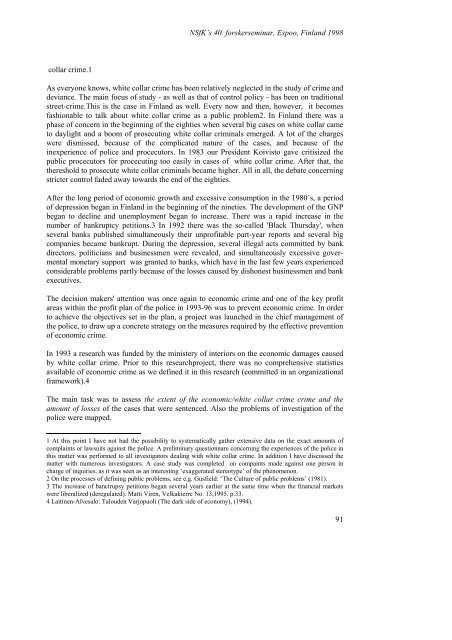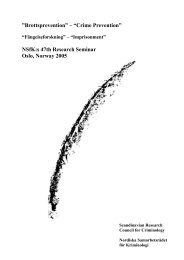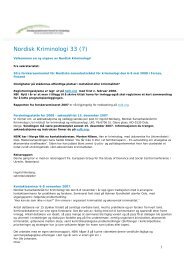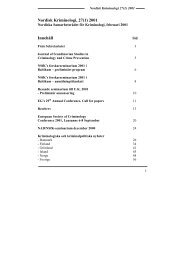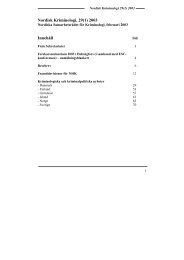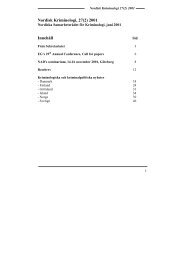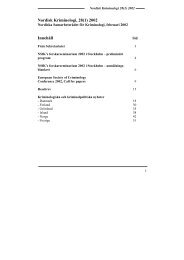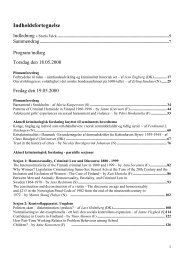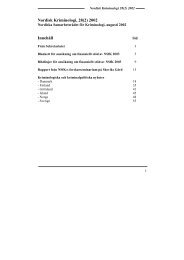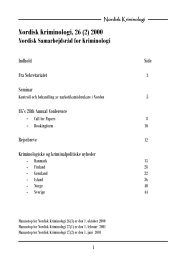Organised Crime & Crime Prevention - what works? - Scandinavian ...
Organised Crime & Crime Prevention - what works? - Scandinavian ...
Organised Crime & Crime Prevention - what works? - Scandinavian ...
You also want an ePaper? Increase the reach of your titles
YUMPU automatically turns print PDFs into web optimized ePapers that Google loves.
collar crime.1<br />
NSfK’s 40. forskerseminar, Espoo, Finland 1998<br />
As everyone knows, white collar crime has been relatively neglected in the study of crime and<br />
deviance. The main focus of study - as well as that of control policy - has been on traditional<br />
street-crime.This is the case in Finland as well. Every now and then, however, it becomes<br />
fashionable to talk about white collar crime as a public problem2. In Finland there was a<br />
phase of concern in the beginning of the eighties when several big cases on white collar came<br />
to daylight and a boom of prosecuting white collar criminals emerged. A lot of the charges<br />
were dismissed, because of the complicated nature of the cases, and because of the<br />
inexperience of police and procecutors. In 1983 our President Koivisto gave critisized the<br />
public procecutors for procecuting too easily in cases of white collar crime. After that, the<br />
thereshold to prosecute white collar criminals became higher. All in all, the debate concerning<br />
stricter control faded away towards the end of the eighties.<br />
After the long period of economic growth and excessive consumption in the 1980´s, a period<br />
of depression began in Finland in the beginning of the nineties. The development of the GNP<br />
began to decline and unemployment began to increase. There was a rapid increase in the<br />
number of bankruptcy petitions.3 In 1992 there was the so-called 'Black Thursday', when<br />
several banks published simultaneously their unprofitable part-year reports and several big<br />
companies became bankrupt. During the depression, several illegal acts committed by bank<br />
directors, politicians and businessmen were revealed, and simultaneously excessive govermental<br />
monetary support was granted to banks, which have in the last few years experienced<br />
considerable problems partly because of the losses caused by dishonest businessmen and bank<br />
executives.<br />
The decision makers' attention was once again to economic crime and one of the key profit<br />
areas within the profit plan of the police in 1993-96 was to prevent economic crime. In order<br />
to achieve the objectives set in the plan, a project was launched in the chief management of<br />
the police, to draw up a concrete strategy on the measures required by the effective prevention<br />
of economic crime.<br />
In 1993 a research was funded by the ministery of interiors on the economic damages caused<br />
by white collar crime. Prior to this researchproject, there was no comprehensive statistics<br />
available of economic crime as we defined it in this research (committed in an organizational<br />
framework).4<br />
The main task was to assess the extent of the economic/white collar crime crime and the<br />
amount of losses of the cases that were sentenced. Also the problems of investigation of the<br />
police were mapped.<br />
1 At this point I have not had the possibility to systematically gather extensive data on the exact amounts of<br />
complaints or lawsuits against the police. A preliminary questionnare concerning the experiences of the police in<br />
this matter was performed to all investigators dealing with white collar crime. In addition I have discussed the<br />
matter with numerous investigators. A case study was completed on compaints made against one person in<br />
charge of inquiries, as it was seen as an interesting ‘exaggerated stereotype’ of the phenomenon.<br />
2 On the processes of defining public problems, see e.g. Gusfield: ‘The Culture of public problems’ (1981).<br />
3 The increase of banctrupsy petitions began several years earlier at the same time when the financial markets<br />
were liberalized (deregulated). Matti Viren, Velkakierre No. 13,1995. p.33.<br />
4 Laitinen-Alvesalo: Talouden Varjopuoli (The dark side of economy), (1994).<br />
91


